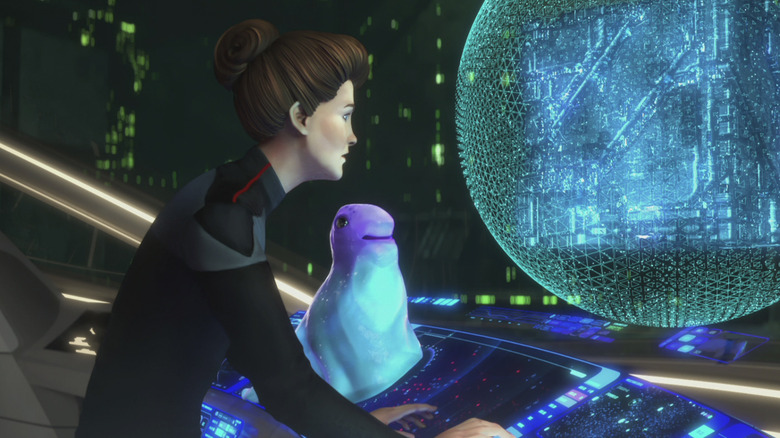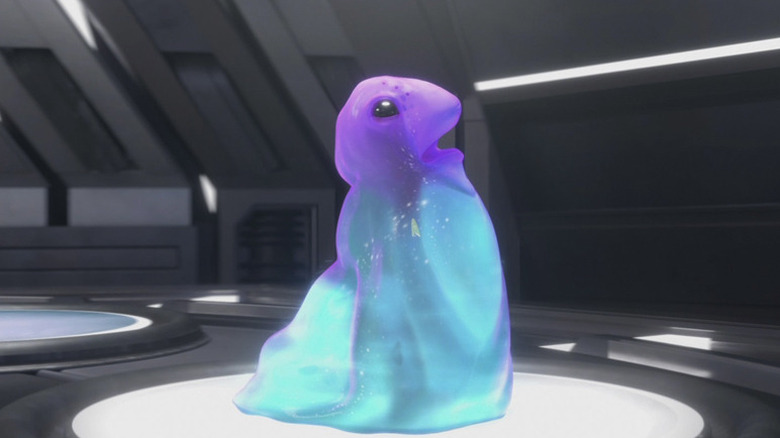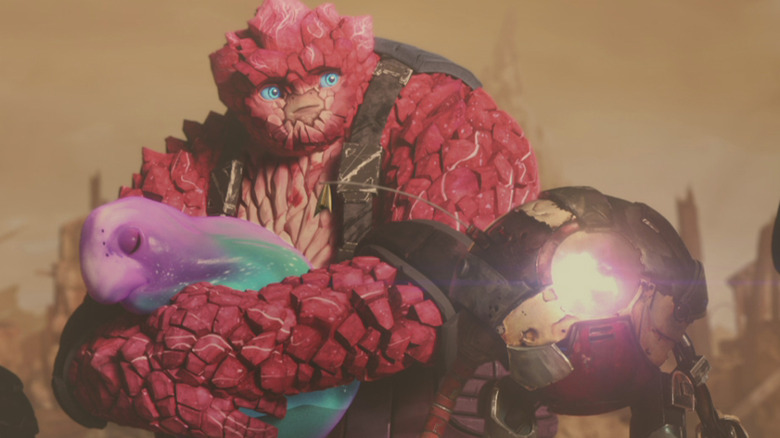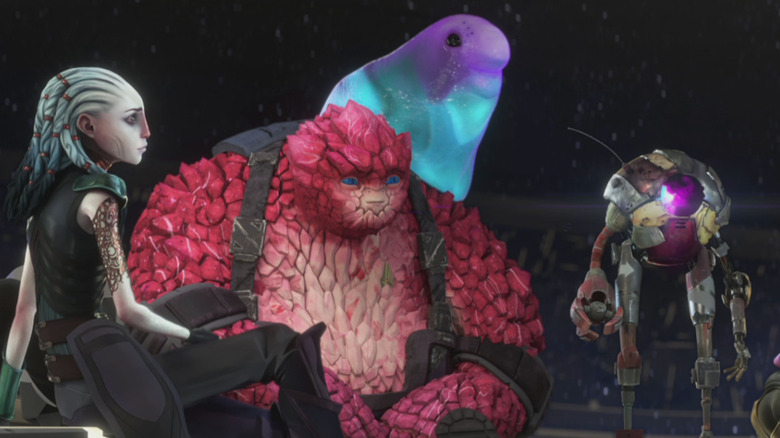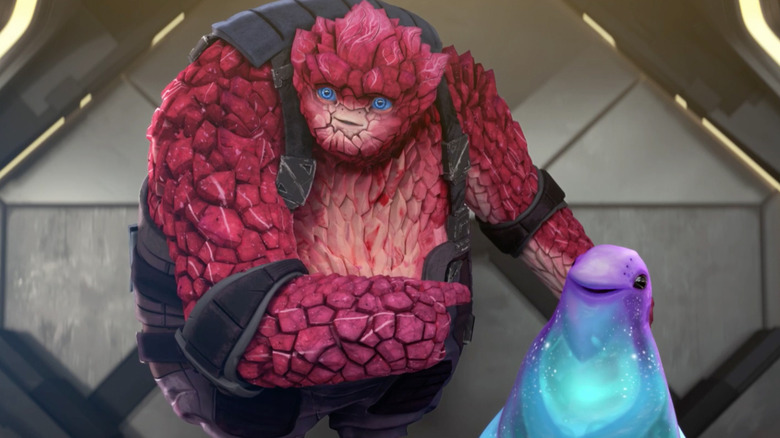Star Trek: Prodigy's Dee Bradley Baker On The Evolution Of Murf [Exclusive Interview]
On "Star Trek: Prodigy," veteran voice actor Dee Bradley Baker plays the character of Murf, a sentient Mellanoid slime worm possessed of a sweet, childlike temperament. Murf hovers somewhere between crew mate and loyal pet, and appears to be indestructible. In an early episode of the show, Murf swallows a photon grenade which explodes inside it. The character is unfazed. Murf also, as of this writing, appears to be mutating into something new, and recently entered a cocoon and pupated into a similar but more humanoid creature with rudimentary limbs. Throughout, Murf has remained nonverbal, communicating through hums, mutterings, and sighs.
Baker is one of his generation's most prolific voice actors, playing not only superhero and "Star Wars" characters, but also providing animal noises for numerous productions. He recently played the voice of the beleaguered frog lady in an episode of "The Mandalorian." Baker first appeared as Olmec in "Legends of the Hidden Temple" in 1993, and has gone on to star some of the most notable cartoon shows and films to have been made since: "Space Jam," "Avatar: The Last Airbender," "SpongeBob SquarePants," "Transformers," "DuckTales," and far too many others to list here. He also played Captain Rex in "Star Wars: The Clone Wars" and "Star Wars Rebels."
In a recent interview, Baker shared his thoughts on Murf and the fundamental difference between "Star Trek" and "Star Wars."
'He starts out as a house pet'
Murf reads as a youthful or childlike character. "Youthful" and "childlike," though, can only remain characters traits for so long. Eventually, Murf will have to grow into an adult version of itself. What kind of character will Murf be in the future?
Well, it's an interesting question, isn't it? Because he starts out as a house pet. But it's also a child, a pre-lingual child that just happily bubbles along and doesn't get too freaked out about things and just has this stance towards the universe. And now and then, seems to do something that really helps things out. So the question is, did they intend to do this or not? And part of what's fun is the slow reveal of the evolution of this creature, which takes a step this week ... but also the way that it communicates is starting to change and becoming a little more sophisticated. So the question logically starts to become, "So where's this going with this little critter? This happy little helpful thing that is more and more able to assist and to have agency in helping with whatever the problem solving is?" It's very interesting. It's a fun little anticipation to [see ideas] slowly hatch as these little space Easter eggs hatch one by one here.
I'm not asking for spoilers, but do you have a good idea as to where Murf might be going?
Well, I have some working knowledge of where things are going ... if only I could speak of them. [laughs]
'We collaboratively paint the head of that pin'
What does a script look like when dealing with a pre-lingual character?
[I have access] to the full script so that I can see what is being said, and so that I know what is playing out. Because everything Murf is saying or emoting or emitting is in relation to the context of the story that's playing out. Much of what he's doing vocally is as if he were in a conversation. It's as if he's saying, "What is that?" Or, "Put me down," or, "I'm hungry," or, "No, no, no, no, no." But there's [interpretation] beneath that, that's always laid out in the context of the script and what the other characters are saying and what's happening in the scene.
Do you write your own "stand in" lines of dialogue for certain moments? Are there brackets of meaning, directions in the script?
Well, what I essentially do is a working — we're clear on what it would be if it were English words. So I'm clear on that as I throw out little variations of, [eagerly] "Wait for me!" Or it's, [plaintive] "Wait for me," or, [sad] "Wait for me," so that the spin on that fits just right with everything else around that. We collaboratively paint the head of that pin, and then I get one that they like the best.
When you delve into a franchise as storied as "Star Trek" or "Star Wars," how much do you immerse yourself in extended lore? "Star Trek" is pretty vast and there's a lot to be learned.
The show is a fresh start with a fresh angle. So I don't need to do a deep dive into any older iteration of "Star Trek." I'm very familiar with the original "Star Trek." And then "Next Generation," I watched a lot of that. And the best thing is with this, or with most any show like this, is it's well-written. It really all comes down to starting from a good script where the relationships are clear, the action is obvious, and then the actor just positions their imagination. So it's really more of looking at the immediate script and then collaborating the tone and the specifics of intent with the showrunners who are directing you. That's more of how it plays out in a [recording] session.
'Star Trek is about democracy trying to work'
Trekkies can be pretty intimidating. I know: I'm one of them. Have you had any interesting feedback from the fan community?
Well, it's my experience the fans at conventions are very nice and very supportive and respectful. And it's a great community no matter what mythology they hail from. I haven't been to a "Star Trek"-specific convention. I got an invite to one. I think it was in Chicago earlier this year, but I couldn't make it. So I've done a fair amount of signing for some fans, at conventions, of Murf so far. So I can tell that they like it. But that was closer towards the beginning of the airing of the series. But I think that I'm going to do a couple of conventions coming up in March, and I think my schedule will allow that. And I'll get to see a little more directly, I think, what fans think of Murf.
I'd be interested to know if the tone of fandom between "Star Trek" and "Star Wars" differs in any notable way.
Well, that's an interesting question. Is there a different tone or a different source of gravity for the enthusiasm of these two different mythologies? To me, they're very related, because "Star Trek" and "Star Wars" are both a space-oriented fantasy that are angled to an ultimately hopeful horizon. So there is that. But for me, "Star Wars" is, ultimately, about resisting tyranny. And "Star Trek" is about democracy trying to work. And so it's like these two political polarities. I think they draw a different character of fan and I don't know how to describe that yet. But there's a different flavor to these mythologies. "Star Trek," it's really more science fiction and science-based. Some of it is very science-based. "Star Wars" is not science — it's more human interaction and morality. And then facing off against this daunting tyranny that sets in when the Emperor Palpatine [executes] Order 66.
But it's an interesting question. It's like, how are these fan bases different? I've never seen them not be accepting of each other or be rejecting of each other. But yeah, there's probably a different character there at work.
'I hope to be involved with that'
"Star Wars" has its jargon, but "Trek" is a lot more multi-syllabic technobabble.
Yeah. Science is very important to "Star Trek," and probably more so now than ever. But it was always very science-based. It's got a positive and optimistic view of science and of Democratic military, and of how these things can work together in a positive way that's not destructive, but that brings hope and better living for more people.
Of the 100,000 characters you've played in your career, do you have any you particularly love? Or hate?
There's nothing I've done that I hated. It's really all fun to me. I love being part of "Star Trek" and "Star Wars," because those are old loves for me. But I was particularly proud of the innovative and refreshing an original universe that the ["Avatar: The Last] Airbender" series brought on Nickelodeon. That was really just such beautiful storytelling on all aspects of it, from the writing, the directing, the characters, and that whole sense of levity and fun and adventure. But also with deep emotional meaning and real-world wisdom that is inherent in that show, which Mike [Dante DiMartino] and Bryan [Konietzko], the showrunners of that, apparently are bringing back. Which is very exciting news for anyone who's a fan of that, which I very much am. I hope to be involved with that. I don't know anything about it so far, but hope to be. But I was particularly proud of that and I was very fond of that series as well.
"Star Trek: Prodigy" is currently airing on Paramount+.
